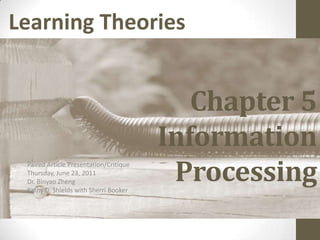Info process ch5_paired_presentation_6_23
- 1. Chapter 5 InformationProcessingPaired Article Presentation/CritiqueThursday, June 23, 2011Dr. BinyaoZhengKathy D. Shields with Sherri BookerLearning Theories
- 2. MEMORYŌĆ£ŌĆ”premised on the belief that memory is a multi-faceted, if not multi-staged, system of connections and representations that encompass a lifetime accumulation of perceptions.ŌĆØ
- 3. Purpose ŌĆō Study LearningEncodeStructureStoreRetrieve
- 4. Research
- 5. Stage TheoriesDiscontinuous and multi-stagedThree stages, sensory, short and long-term memoryVisual ┬Į second transferAuditory 3 second transferAttentionAutomaticityHolistic versus individual characteristicsShort-term 15-30 second unrehearsedLimitations on working memoryEncoding is criticalElaboration can transfer from short to long-term
- 6. Network TheoriesŌĆ£To perceive is to categorize, to conceptualize is to categorize, to learn is to form categories, to make decisions is to categorize.ŌĆØ (Bruner, 1998, pg. 3).Categorizing Memories (pg. 6)EpisodicSemanticDeclarativeProcedural
- 7. Non-Linear Memory TheoryLevels of Processing Not staged
- 10. Meaningfulness
- 11. Attention
- 12. Depth of ProcessDual Coding-ConnectionistLanguage & Nonverbal(Rumelhart, 1980, pg. 8)
- 13. Memory stored throughout the brain
- 15. Connections throughout the networkBrain ChangesMaturity
- 16. Experience
- 20. Increased Capacity to Solve ProblemsApplicationsEncoding ElaboratingCategorizingComparingStrategy Assimilation over time (pg. 10)Allow for Deep ProcessingBlooms (pg. 11)ŌĆ£ŌĆ”meaningful learning is reflective, constructive, and self-regulated.ŌĆØ (pg. 14)










